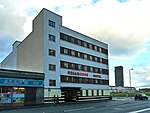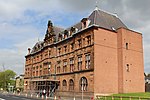St Mungo's Academy
1858 establishments in ScotlandBridgeton–Calton–DalmarnockCatholic secondary schools in GlasgowEducational institutions established in 1858Marist Brothers schools ... and 1 more
Use British English from July 2015
St Mungo's Academy is a Roman Catholic, co-educational, comprehensive, secondary school located in Gallowgate, Glasgow. The school was founded in 1858 by the Marist Brothers religious order. The debate team at St Mungo's were the first Scottish team to represent the UK at the World Parliamentary Debate Competition, which they won. They were congratulated by First Minister Nicola Sturgeon.
Excerpt from the Wikipedia article St Mungo's Academy (License: CC BY-SA 3.0, Authors).St Mungo's Academy
Gallowgate, Glasgow Gallowgate
Geographical coordinates (GPS) Address Phone number Website External links Nearby Places Show on map
Geographical coordinates (GPS)
| Latitude | Longitude |
|---|---|
| N 55.8541 ° | E -4.2207 ° |
Address
St Mungo's Academy
Gallowgate
G40 2RA Glasgow, Gallowgate
Scotland, United Kingdom
Open on Google Maps








